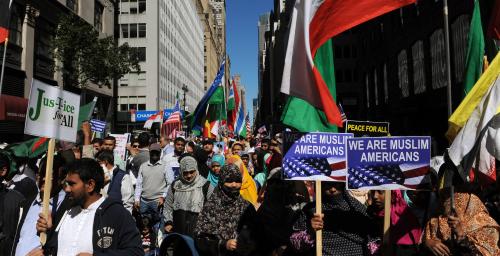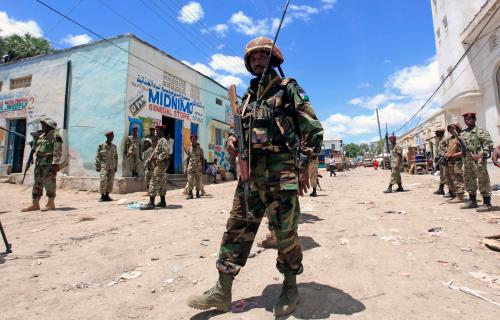The following is part of the Series on Counterterrorism and American Statutory Law, a joint project of the Brookings Institution, the Georgetown University Law Center, and the Hoover Institution
Introduction
America’s civil litigation system is designed to resolve disputes fairly between parties and to compensate people who have been wronged. When officials or agents of the federal government are sued, open courts hold the government publicly accountable to the rule of law, protecting the basis of the constitutional republic. Opinions are generally published; proceedings are open to the press and the public at large. The assumption underlying the adversarial system is that a just outcome is achieved when each party in the dispute has an equal opportunity to make its best arguments on the legal and factual issues at stake in the full glare of the public eye. This requires that all parties to the litigation have access to evidence and information that may be helpful to resolving the case.
This carefully-constructed system begins to break down when a lawsuit requires the disclosure of secret information that could threaten the security of the nation. Consider the following scenarios:
- A woman sues the federal government alleging that its negligence allowed a military plane to crash, killing her husband. The government responds that the accident report detailing the crash contains details of secret military equipment and missions that, if disclosed, would greatly benefit the nation’s enemy, and so it cannot allow the crucial evidence in the case to be introduced.
- A man sues government officials alleging that they have kidnapped and tortured him in a secret, illegal program. The government tells the court that even considering the case would lead to the disclosure of state secrets, putting the nation’s security at risk.
- The administrator of an estate sues the federal government alleging that it has violated a secret contract the deceased had to spy for the government several years back. The government responds that the court cannot enforce a secret contract, for to do so would render it non-secret.
- Government officials publicly acknowledge that they have been conducting warrantless electronic surveillance through a new program. A group of citizens sue the government, claiming that this program violates federal laws and the Constitution and asking federal courts to halt the program. The government responds that disclosing how the program works or who has been subject to surveillance under it would allow the nation’s enemies to evade surveillance.
Each of these scenarios tracks an actual case filed in America’s courts. With little guidance from the Supreme Court, and none from Congress, federal courts have struggled to reconcile the conflicting demands of public justice and national security raised by these and similar cases. If courts dismiss cases or deny parties access to important evidence at the request of the Executive Branch, they may fail to provide redress to parties who have been wronged and uphold the rule of law. If courts discount the national security implications of publicly disclosing secret evidence, they may place the security of the nation as a whole at risk.
There are two broad doctrines available in civil cases that implicate the nation’s security. One is a jurisdictional or justiciability rule—in other words, a rule that forbids the court from considering the case at all. A second approach is an evidentiary privilege, a rule that specifies how certain types of evidence may be used in a lawsuit. In recent years, prompted by the government, some courts have increasingly conflated these two different approaches under the single heading of the “state secrets privilege.” Under current doctrine, the government may assert the “state secrets privilege” to ask that courts dismiss a case, prevent the use of evidence in it, or both. Defined broadly in this way, as both an evidentiary privilege and a justiciability rule, the “state secrets privilege” has become the single mechanism by which courts attempt to navigate the challenge presented by civil lawsuits related to secret national security information.
Because the Executive Branch usually has an interest in the outcome of cases in which it asserts the state secrets privilege, it may be tempted to abuse it to avoid political embarrassment or liability. Without proper rules in place, the Executive Branch can, in effect, choose whether it would like to be held publicly accountable, what evidence it will allow opponents to use against it, and when it would like its actions to be free of judicial scrutiny. In the years since 9/11, as cases involving security issues have become more central to our national debate, the potential for abuse has grown.
Congress should act now to provide federal courts with clear guidance for civil cases in which they must balance the competing demands of open justice and state secrecy. Although the Supreme Court and the Executive Branch also could implement these reforms, both branches have declined the opportunity to do so over many years and under many leaders.[i] The Constitution gives Congress the authority to establish rules of jurisdiction, procedures, and evidence for the courts, and it should do so here.
To protect the privilege, several specific reforms are necessary. Congress should begin by separating the two distinct approaches to this set of cases. It should clarify that the “state secrets privilege” is a rule of evidence and not a rule of justiciability, and it should prevent courts from dismissing cases on the basis of the state secrets privilege until they have had a chance to assess the privilege claim and see other available, non-privileged evidence that might bear on its adjudication. Congress should also provide courts with a set of tools and standards to determine which evidence should not be disclosed in civil proceedings because of the risk of harm to national security. These tools should include procedural rules to minimize the burden on courts; pre-cleared experts, special masters, and attorneys to assist the judge and affected parties with specialized expertise in national security issues; and procedures to create substitute evidence when doing so would not harm national security. Congress should design these procedures so that even if some evidence must be unavailable, the cases can proceed as far toward resolution on the merits as possible, without endangering national security. Alongside this reform of the privilege, Congress should put rules in place so that, even if secret evidence prevents the civil litigation system from dispensing justice in certain cases, other government institutions can fill in for the courts by providing redress to wronged parties and ensuring government accountability.
The paper proceeds as follows. Part I explains how cases involving state secrets work today in the civil, criminal, and administrative contexts. It then traces the history of how American courts have handled these issues, ending with an examination of some high-profile post-9/11 national security cases. Part II outlines more specific suggestions for reform, presenting the options available to Congress, discussing their costs and benefits, and laying out a roadmap for reform. Finally, Part III relates this discussion to the concept of a national security court and offers some concluding thoughts.
[i] In fact, the Supreme Court recently declined to grant review of two recent cases asking it to reconsider the privilege. . . El-Masri v. Tenet, 437 F. Supp. 2d 530 (E.D. Va. 2006), aff’d 479 F.3d 296 (4th Cir. 2007), cert. denied, 128 S. Ct. 373 (2007); ACLU v. NSA, 493 F.3d 644 (6th Cir. 2007), cert. denied, 128 S. Ct. 1334 (2008);

